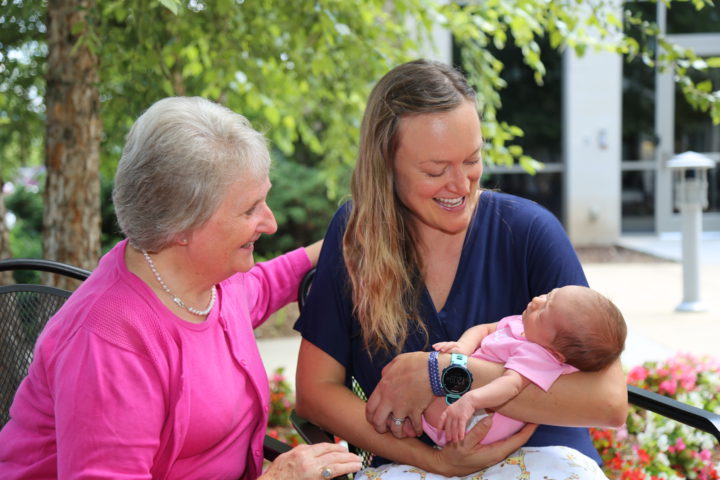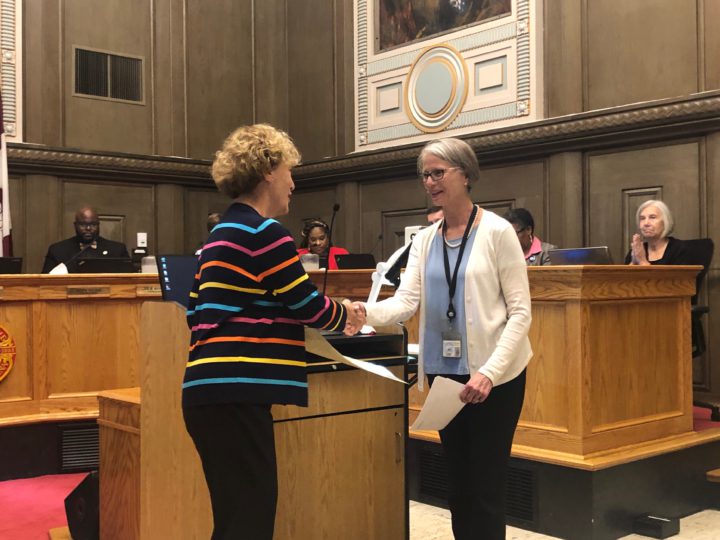In the run-up to World Breastfeeding Week, Thursday-Wednesday, Aug. 1-7, local elected officials have proclaimed their intention that Asheville and Buncombe County should be a breastfeeding-friendly community. But earning the breastfeeding-friendly designation, Buncombe County Health and Human Services Director Stoney Blevins told county commissioners, involves a 10-step process — and we’ve only just begun.
The second step in the Breastfeeding-Family-Friendly Community Designation (developed by the Carolina Global Breastfeeding Institute) reads, “The community as a whole provides a welcoming atmosphere for breastfeeding families.” Local moms say there’s a long way to go before the city and county can check that box.
Asheville resident Tatiana Rivest, a first-time mom whose daughter is 8 months old, says she’s scared to breastfeed in public places. After hearing stories of mothers being scolded and kicked out of local businesses, she has decided to nurse her baby in the car instead.
A May survey commissioned by Asheville-based Aeroflow Healthcare found that one in four American women (25%) and one in five men (22%) find breastfeeding or pumping in public places inappropriate. Women, the survey found, were more likely to feel uncomfortable seeing a mom nursing her baby in public than men (30% of women versus 24% of men). And 61% of respondents felt that nursing or pumping in a restaurant is not OK.
The milky way
Lactation expert Georganna Cogburn imagines a truly breastfeeding-friendly community as a place where new moms are supported in all aspects of their lives. Mothers would feel safe to breastfeed in public, whether in a store, restaurant or park. They would receive prenatal lactation consultations from health care providers, as well as time and space to pump breast milk while at work. She’d also like to see designated breastfeeding rooms at child care centers.

Cogburn works with the Mountain Area Health Education Center and provides lactation education for breastfeeding peer counselors and health department staff members involved with Women, Infants and Children nutrition programs throughout Western North Carolina. Realizing the breastfeeding-friendly vision, she says, will take broad support and participation throughout the community.
“It will require time and effort to assure that all health care providers, business owners, child care providers are educated on the value of breastfeeding for the families which use their services,” Cogburn says. “Education is only the first step. After education, all will have to adopt a change in policy and attitude.”
Breast is best
Buncombe County Commissioner Jasmine Beach-Ferrara highlighted some of nursing’s health benefits as she read a proclamation supporting breastfeeding at the July 16 meeting of the Board of Commissioners.
According to the American Academy of Pediatrics, Beach-Ferrara said, breastfeeding is associated with lower rates of communicable disease and obesity in infants, as well as a decreased risk for postpartum complications and breast and ovarian cancers in mothers. A report from the Academy of Nutrition and Dietetics says that breast milk is a “living biological fluid” with many qualities that cannot be replicated by formula substitutes, she added.
Reading the city’s proclamation declaring Asheville a breastfeeding-family-friendly community on July 23, Vice Mayor Gwen Wisler said, “A mother’s decision to breastfeed should be supported by her family and community.” She pointed to “persistent inequities” affecting Buncombe County’s youngest residents, noting that African American babies are almost four times as likely to die in the first year of life as white babies. Providing a supportive and welcoming environment for breastfeeding in the community, Wisler said, “could be an antidote to tragedy and a strategy toward advancing equitable birth outcomes in the city of Asheville and Buncombe County.”
Barriers to breastfeeding
Among participants in the Buncombe County WIC program, there is a significant disparity between the number of white women and women of color who are able to successfully breastfeed their infants. According to Blevins, as of May, 24% of white WIC participants exclusively breastfeed compared with 17% of WIC participants of color, and 15% of white WIC infants were partially breastfed compared with 13% of infants of color.
According to information on the N.C. Department of Health and Human Services website, children younger than five, pregnant women and women who have had a baby in the last six months can receive WIC. Eligibility for mothers extends to 12 months following birth for those who breastfeed. A family income of less than 185% of the poverty level is required to qualify. The service provides “basic nutritious foods,” as well as education and support, to eligible participants, the website explains.

For those who can access the available resources, Asheville has a leg up on other corners of Western North Carolina, according to MAHEC’s Cogburn. “Asheville is better than some of the areas in our region,” she explains. “Once you leave Asheville proper, the resources that are available to help women breastfeed are not as plentiful, and women struggle because they don’t have access to the resources they need. There are limited resources even in Buncombe County, just because the number of moms that need help and the number of people that are available to help them don’t match up.”
Supportive resources include access to health care providers and lactation specialists in case of a complication, education for first-time mothers, and pumping locations and equipment to allow mothers to continue supplying milk after returning to work.
Education is key
Jen Chandlee, a certified lactation educator at Homegrown Babies, teaches weekly breastfeeding and newborn-readiness classes to help prevent problems before the baby is even delivered.
“To have the biggest chance of success with breastfeeding, prenatal education is the best way to do that,” Chandlee says. “Most people think that baby’s just going to know how to do it, or mom’s just going to know how to do it, but it just doesn’t work that way for a lot of people. If they don’t know that help is out there or when to get help, they will often stop nursing.”
Through her work with the WNC Breastfeeding Coalition, Chandlee and her co-workers have offered to collaborate with local school systems and businesses to find ways for employers to better support their staff members who are nursing.
“One of the things we know that’s helped promote breastfeeding success, especially for breastfeeding people who are going back to work, is to make the workplace breastfeeding-friendly,” Chandlee says.
To continue to produce milk, a woman must nurse her baby or pump milk on a regular schedule. According to information provided by the La Leche League International, a breastfeeding advocacy organization, that means expressing milk every two to three hours for most mothers. Over the course of an eight-hour workday, that could mean three pumping breaks of at least 15 minutes per break to maintain a mother’s milk supply.
Making it work
Aeroflow Healthcare supplies breast pumps to women with qualifying insurance coverage. Jennifer Jordan, who directs the company’s Mom and Baby department, says Aeroflow uses a variety of approaches to boost breastfeeding awareness, including deploying its Breast Express, a mobile breastfeeding-friendly RV “with boobs painted all over the side” to various events and locations.
“Unless mom is kind of initiating that need for lactation support or possibly talking to her child’s pediatrician, who may or may not have resources in the office to support breastfeeding, sometimes mom can get lost,” Jordan says. “It’s really about hoping that mom has those conversations prior to birth and knows and understands the resources in the area so if she is having challenges, she is able to take advantage of those and can reach her breastfeeding and pumping goals.”
Aeroflow provides a public pumping room — a resource that can be hard to come by — in its headquarters at 65 Beale Road in Arden.
Rivest recalls having to use a courthouse locker room to pump when she served on jury duty several weeks ago. The room did not lock, and she was frequently interrupted. Fortunately, she found her previous workplace more accommodating.
“People get smoke breaks — why shouldn’t moms have breaks to pump?” Rivest asks. “I was also very fortunate to have a spare office to use while I was employed but have also heard of moms having to pump in their cars. It’s wild how unaccommodating our society is to this.”
Aeroflow is about to launch its second annual pumping room makeover contest in celebration of National Breastfeeding Awareness Week. During August, businesses can apply for a free pumping room makeover, which could include everything from new furniture to appliances. The five finalists and the winner will be selected through a public forum.
While Asheville is on its way to becoming a breastfeeding-friendly certified city, Chandlee says spreading the word about resources is key.
“I think we have a lot of fantastic resources, but I think there can never be enough,” Chandlee says. “There is a lot of support available, but I think the biggest issue is getting the word out about where women can get help.”
Editor’s note: This story has been changed from the print version to reflect the correct spelling of Stoney Blevins’ name.




Barf. Gross.
I am going to throw up.
Breastfeeding babies is what breasts are designed to do. Any one who is bothered by this is…kind of silly and immature to be honest. You have a problem with the most natural thing in the world – a mother feeding her baby? Please feel free to look away, it is that simple.
It’s just jealousy. The same bunch went bonkers in the forums when the young mother nursed her son during Sunday lunch at Denny’s. They went crazy when women marched topless downtown. If you think men are insecure about their bodies, body shapes, and appendages…
What a beautiful picture at the top of the story! Even if the adults are acting, the baby’s certainly not! Breastfeeding is baby heaven. 😊
You people reacting in disgust…your opinion doesn’t matter. I encourage all breastfeeding moms to feed your baby ANYWHERE that baby is hungry. It’s your and your baby’s right. Screw the imbeciles who dare to believe that breasts were made for adults. Their perfect design is nature’s gift to babies.